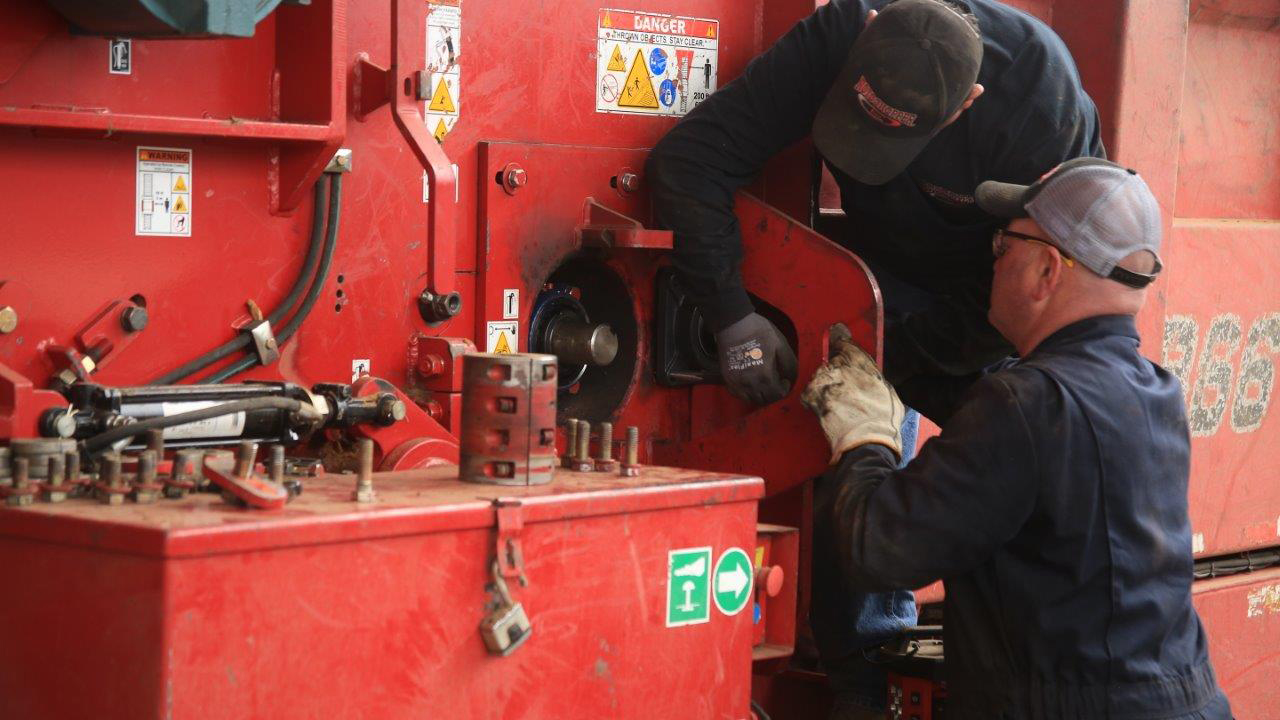
Right now, you might be looking to maintain or repair your machines faster and cheaper. You may be opting to do it yourself, and in many instances — especially if you have a skilled and experienced mechanic — it can be a smart move. But for some repairs, there’s the potential to cause further damage to other components or systems, which could end up costing you a lot more time and money in the long run.
So, which equipment maintenance and repairs are good for DIY and which ones really require an experienced product specialist with the right tools? Here are some common repair and service tips that can help you decide.
Common DIY Machine Repairs
Safety is a top priority so before you begin, you should always follow all safety guidelines as outlined in your Operation & Maintenance Manual.
- Routine maintenance like oil changes, filter changes and greasing. These are pretty straightforward services you can do in your shop. In fact, you should be performing these maintenance tasks on your machines on a regular basis. Maintenance tasks like these are all called out in your operator’s manual.
- Minor welding (depending on the location on the machine). In most scenarios, it’s okay to weld on areas that don’t require exact welding specs. For example, hardfacing on wear liners, rotor rakers, tooth mounts, etc. It’s always advisable to talk to Rotochopper customer support first.
- Minor wire harness repairs and changing of relays and fuses. If you find that some wires are nicked, cut, or damaged, you can easily splice in something new — cleaning up corrosion and changing out relays and fuses is easy, too. Where you can get into major issues with the harnesses though, is when extensive damage means it needs to be replaced completely. There are also some situations where connectors are damaged, and you need special tools to pull out and re-pin the connector. These kinds of repairs are better suited for a product specialist.
- Replacing some parts/components such as cylinders, pumps, and motors that are simple to remove/replace. Components that bolt on — where you can unbolt it, bolt on a new one and attach a hydraulic hose or whatever you need — are relatively easy to do. It’s trickier when a set up requires a certain pressure spec that needs to be adjusted — for example, control valves and relief valves – they need to be factory adjusted after installation.
- Adjusting and replacing wear items like teeth, tooth mounts, screens, slab ramps, etc. These are tasks your mechanics should be able to handle. View our helpful how to videos in the Rotochopper University library for more information on these tasks.
- Hydraulic hose replacements. The main thing you have to be careful of is making sure your replacement hoses are the right specs — the right size, durability and strength of the hose pressure rating.
Middle of the Road Machine Repairs
There are also some common repairs that customers may think are DIY but end up costing them more time and money down the road. Here are a few of the more common situations we hear about:
- Most Welding. It’s always advisable to check with Rotochopper customer support before performing any welding on your grinder. After talking with someone, customer support may say it’s something you can do on your own, or they may ask that you hire a local welder to follow specific instructions. Always have safety top of mind before you decide to take on a weld yourself.
Machine Repairs & Maintenance Best Suited Customer Support
- Setting the main bearings. The main bearing placement and tightening is very precise work, which is why it is best completed by a Rotochopper product specialist. Ensuring that the main rotor bearings are installed properly is important because you do not want to damage the rotor shaft. If the rotor shaft is damaged, you will most likely have to replace the rotor.
- Changing rotors. Changing the rotor should be completed by the Rotochopper service team because it’s a major job and also requires replacing and setting the main bearings.
- Any engine work. Rotochopper customer support can help troubleshoot with you, but any work required on the engine of your Rotochopper equipment should be completed by the engine manufacturer.
- Any electrical work. Electrical work on your electric grinder and electrical panel should always be completed by a licensed electrician. You can be seriously injured or killed by making a mistake on a high voltage panel. Electrical work on a diesel grinder can be performed by most mechanics.
For repairs like these, lack of expertise can add to repair time and costs. If it takes you hours more than what a factory-trained product specialist could do, you might end up costing yourself more money in the long run. It’s easy to get into an area that’s very complicated, and in the attempt to fix something, you end up damaging something else.
The best recommendation we can give is to discuss with Rotochopper customer support whether you can handle a repair and if there are certain required tools that you don’t have. Again, you should always follow all safety requirements as outlined in your Operator’s Manual. Careful consideration also has to be taken on whether the decision to replace a part or component is straightforward, or if there’s additional work that also needs to be done. Scheduling a service visit for these types of scenarios can save you a lot of time and money down the road.
Visit the Rotochopper University section of our website to learn more about the maintenance and repair videos and tip sheets we have available to keep customers up and running more efficiently and safely.
